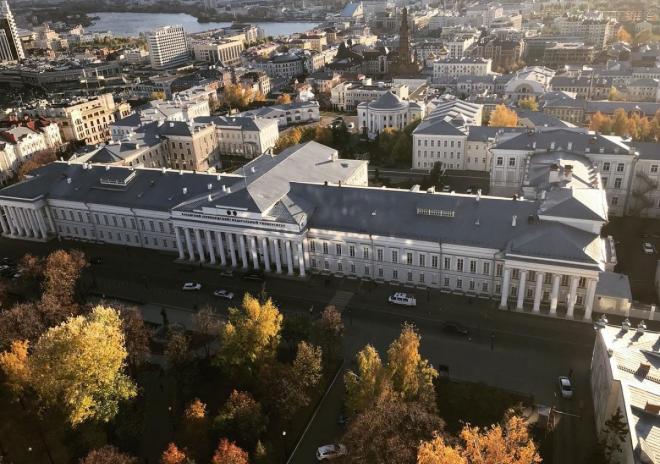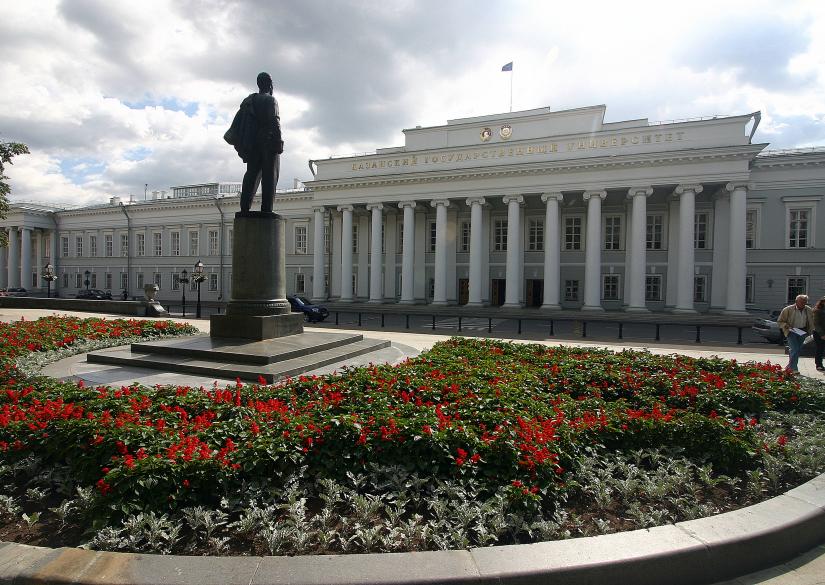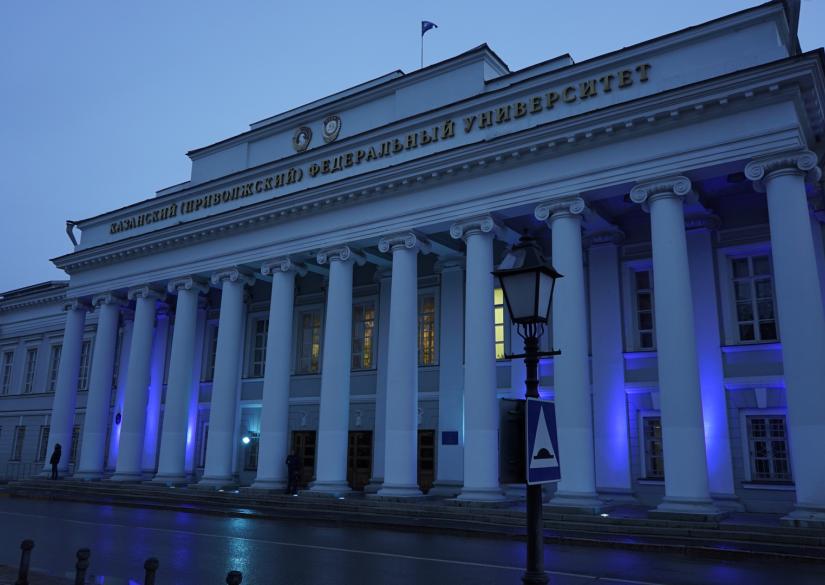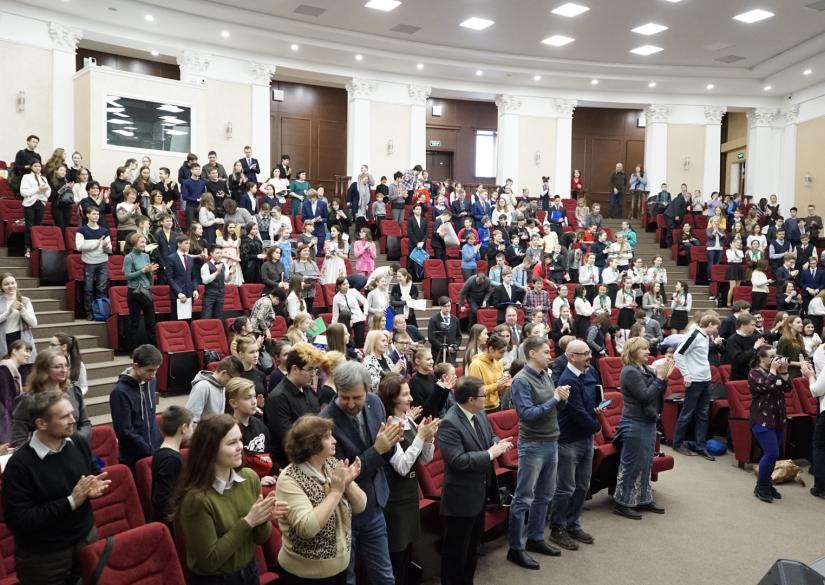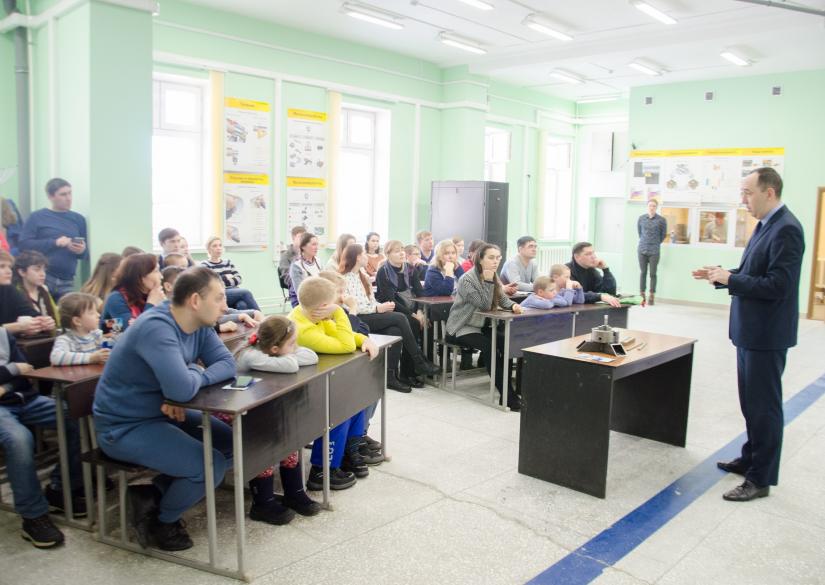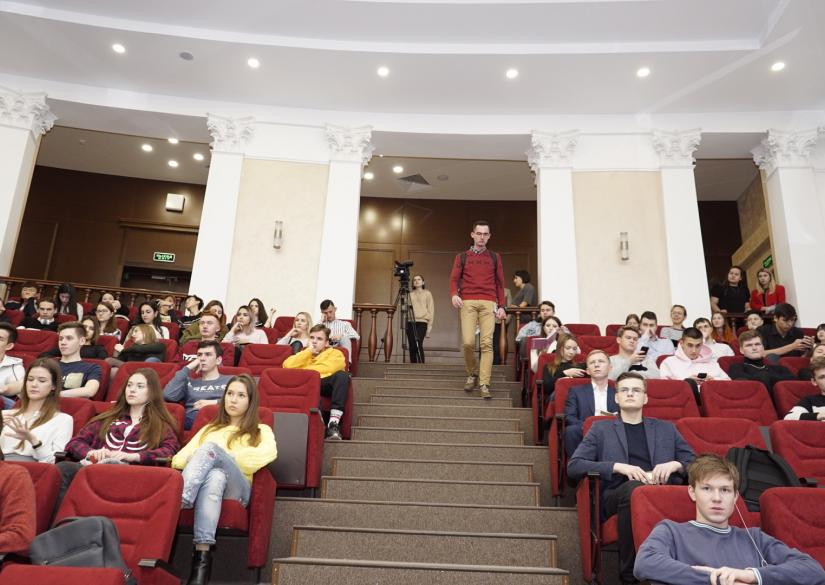Kazan Federal University, KFU
Programs and prices, tuition fees in Kazan Federal University, KFU
Undergraduate
- Age of students: 17+
- Language of instruction: Russian
- Duration: 4-5 years
- Type of studying: mixed.
Popular directions for studying:
- Physics and mathematics
- Natural Sciences
- Informatics and computer engineering
- Automation and control
- Geodesy
- Mineral development
- Environmental Protection
- Economics and Management
- Education and pedagogy
- Humanities and social sciences
- Medicine
- Culture and art
- Service sector.
Master's degree
- Age of students: 21+
- Language of instruction: Russian
- Duration: 1-2 years
- Type of studying: mixed.
Directions:
- Psychology and education
- International relationships
- Socio-philosophical sciences
- Mathematics and Mechanics
- Computational Mathematics
- Physics
- Engineering school
- Economics and finance
- Information technology and systems.
Description of Kazan Federal University, KFU
- Established: 1804
- Location: Kazan, Russia
- Students age: 17+
- Number of students: 44992
- Language of instruction: Russian
- Type of studying: mixed.
Kazan Federal University is included in the TOP-3 of the oldest universities in Russia: the educational institution was founded by order of Alexander I. In the 1800s, acquaintance of the cultures of the West and Asia was considered one of the goals of Kazan University, so the university became a center for the development of science, art and education. Today KFU cooperates with more than 40 educational institutions abroad and participates in the programs IREX, Fulbright, USIA, DAAD, TEMPUS, INCO-Copernicus, "Eurasia". One of 10 federal universities, included in the State Code of Especially Valuable Cultural Heritage Sites of the Peoples of the Russian Federation. The main building of the university is an architectural landmark and a visiting card of the city.
University facts:
- 12th place in Russia
- 26 Nobel laureates
- 4000 teachers
- 40,000 students.
University faculties
- Graduate School of Business KFU
- Graduate School of Information Technology and Intelligent Systems
- Engineering Institute
- Institute of Computational Mathematics and Information Technology
- Institute of Geology and Oil and Gas Technologies
- Institute of Mathematics and Mechanics. N.I. Lobachevsky
- Institute of International Relations
- Institute of Psychology and Education
- Institute of Social and Philosophical Sciences and Mass Communications
- Institute of Management, Economics and Finance
- Institute of Physics
- Institute of Philology and Intercultural Communication
- Institute of Fundamental Medicine and Biology
- Institute of Ecology and Nature Management
- General education boarding school IT-lyceum
- Comprehensive boarding school Lyceum named after N.I. Lobachevsky
- Preparatory Faculty for International Students
- Chemical Institute named after A.M. Butlerova
- Faculty of Law.
Place in world rankings:
- QS World University Rankings = 370
- QS by Subjects Humanities = 345, Math = 301-350, Business & Economics = 301-400, Medicine = 501-600, Computer Science = 601-800
- Times Higher Education: European University Top 200 = 276
- US News & World Report = 783
- Moscow international ranking "Three missions of the university" = 351-400.
Accreditations
- American Association for Higher Education Accreditation
- American Educational Research Association
- Association of Eurasian Universities EURAS
- Association of University Administrators
- Global University Network for Innovation (GUNI).
Partner universities
- Giessen University J. Liebikha
- University of Strasbourg
- Kanazawa University
- Japan Research Institute RIKEN
- Cambridge university
- Technical University of Dresden
- Humboldt University
- Trinity College Dublin
- University of Helsinki
- University of Bologna
- Hunan Normal University
- Beijing Normal University
- Arizona State University
- University of Miami
- Southwest Petroleum University (Chengdu, China).
Famous graduates
- Nikolai Lobachevsky, creator of non-Euclidean geometry
- Leo Tolstoy, Russian writer
- Vladimir Lenin, Soviet statesman
- Evgeny Zavoisky, experimental physicist
- Nikolai Zinin, an outstanding chemist
- Alexander Butlerov, author of the theory of the chemical structure of organic substances
- Ivan Baudouin de Courtenay, distinguished linguist
- Vladimir Engelhardt, biochemist
- Igor Tarchevsky, Russian and Soviet plant physiologist
- Alexander Konovalov, scientist
- Ivan Simonov, one of the discoverers of Antarctica
- Stanislav Govorukhin, film director, screenwriter, actor.
Faculties and colleges
- Kazan Federal University School of Business,
- Higher School of Information Technologies and Intelligent Systems,
- Institute of Engineering,
- Institute of Computational Mathematics and Information Technologies,
- Institute of Geology and Oil Technologies,
- Lobachevsky Institute of Mathematics and Mechanics,
- Institute of International Relations,
- Institute of Psychology and Education,
- Institute of Social and Philosophical Sciences and Mass Communications,
- Institute of Management, Economics and Finance,
- Institute of Physics,
- Institute of Philology and Intercultural Communication,
- Institute of Fundamental Medicine and Biology,
- Institute of Ecology and Nature Use,
- Boarding School – IT Lyceum,
- Boarding School – N.I. Lobachevsky Lyceum,
- Preparatory Faculty for Foreign Students,
- Institute of Continuing Education,
- A.M. Butlerov Chemical Institute,
- Faculty of Law,
- Sberbank Corporate University,
- Pharmaceutical Research and Education Center,
- Faculty for Advanced Training and Retraining of Personnel for Higher Educational Institutions.
Accommodation, meals, prices
Students are provided with a place in the university dormitories:
- Universiade Village
- Dormitory №5 of the Student Town, st. Gvardeyskaya, 32
- Dormitory №8, Student Town, st. Pushkin, 32a
- Dormitory # 4, Student Town, st. Red Position, 2A.
Activities Kazan Federal University, KFU
The university regularly hosts cultural and sports events, sections and clubs of interest. Popular directions:
- Choreography
- Costume studio
- Vocal ensemble
- Dance collective
- Literary association
- Youth theater
- Choral ensemble
- Theatrical collective
- Chess
- Student government
- Sports, healthy lifestyle, tourism
- Swimming
- Football
- Basketball.
Facilities and equipment at Kazan Federal University, KFU
The University has a modern infrastructure; in 2011, the Technological Center was inaugurated with the departments of vacuum-plasma technologies and the department of metrology and standardization. The infrastructure of the university includes the Scientific Library named after N.I. Lobachevsky (among the ten largest library funds in Russia), the publishing house of Kazan University (one of the oldest in Russia), sports facilities, a large concert hall, and a climbing wall.
Admission dates and extra charges
The academic year is traditionally divided into two semesters, with summer and winter sessions, and short breaks after them.
Perspectives
- Nikolay Lobachevsky, creator of non-Euclidean geometry,
- Leo Tolstoy, Russian writer,
- Alexander Romanovich Luria (Soviet psychologist, founder of domestic neuropsychology),
- Vladimir Lenin, Soviet statesman,
- Evgeny Zavoisky, experimental physicist,
- Ivan Yakovlevich Yakovlev (Chuvash educator, Orthodox missionary, teacher, organizer of folk schools, creator of a new Chuvash alphabet and textbooks in Chuvash and Russian languages for the Chuvash people, writer, translator, folklorist),
- Nikolay Zinin, outstanding chemist,
- Alexander Butlerov, author of the theory of chemical structure of organic substances,
- Ivan Baudouin de Courtenay, outstanding linguist,
- Vladimir Engelhardt, biochemist,
- Alexander Mikhailovich Zaitsev (organic chemist, corresponding member of the St. Petersburg Academy of Sciences),
- Igor Tarchevsky, Russian and Soviet plant physiologist,
- Alexander Konovalov, scientist,
- Ivan Simonov, one of the pioneers of Antarctica,
- Stanislav Govorukhin, film director, screenwriter, actor,
- Nikolay Nikolaevich Zinin (organic chemist, academician of the St. Petersburg Academy of Sciences, first president of the Russian Chemical Society),
- Nikolay Alexandrovich Semashko (Soviet party and state figure, doctor, one of the organizers of the healthcare system in the USSR) and many others.
Entry requirements, how to apply, what is required to enrol
Admission to universities is mainly based on the results of the Unified State Exam (USE) and the competition of certificates. Usually, 2-3 students compete for a place; the university is considered average in terms of competition rigor.
Institution on the map
Residence permits, citizenship and other services
- Guardianship services during the studies
- Student supervision
Review about Kazan Federal University, KFU
Recommendations on when to apply
| Language courses, schools and children's language camps | Primary and secondary education - private schools | Preparation programmes for entering universities - higher education | Higher education (after completing accredited programs A-level, IB, High School) - Bachelor, Master, MBA |
| - we recommend to apply 6-9 months before the start of the course (some camps and schools offer discounts for early booking or for lengthy study programs) - there are some very popular and high demand children's camps, where the applications need to be submitted 1 year in advance (in particular Switzerland , Great Britain , USA , Canada , Austria) | - we recommend to apply one year before the start of the training program, - some schools have a specific time frame (September-November - please specify an individual school) - some schools require tests in several stages (UKISET, internal tests of the school: English, mathematics, logics, subjects, interview, some require a personal visit) | - we recommend to apply one year before the start of the program, - for Foundation and Pathway programs, IELTS and TOEFL certificates are usually required, respectively | - recommended submission one year before the start of the program, - the deadline normally closes in January, for TOP HEIs and, as a rule, in March in other universities - for a bachelor, a Foundation or Pathway preparatory program a completed A-level, IB, High School + IELTS / TOEFL are required - for Masters you need a graduated higher education, in some cases you need a pre-Masters program - MBA requires completed higher education, work experience preferably at least 2-3 years, etc. |


